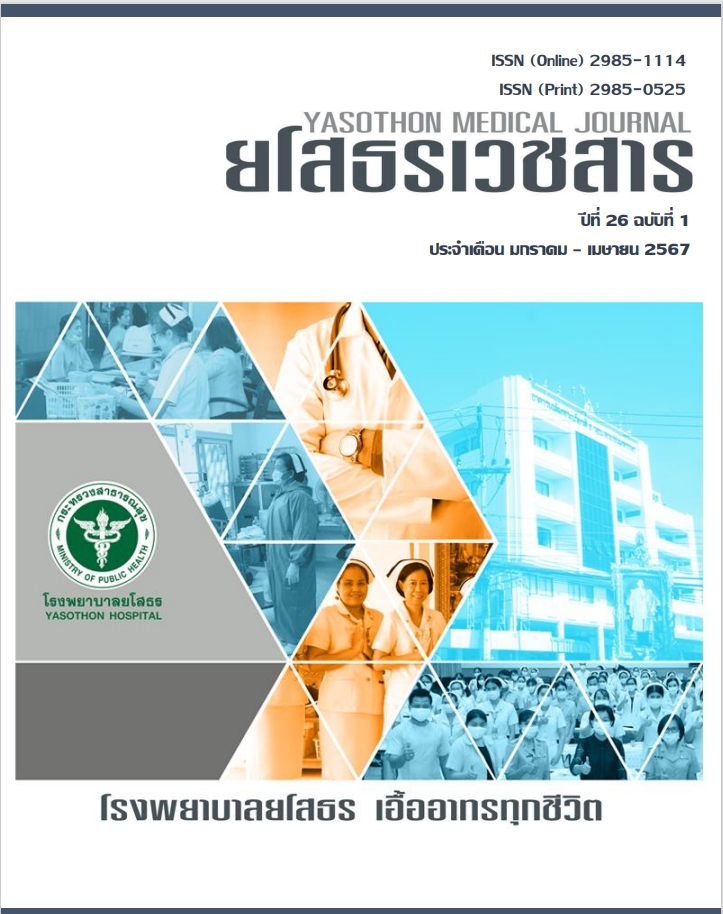การพยาบาลผู้ป่วยโรคไตเรื้อรังระยะสุดท้ายที่ได้รับการดูแลแบบผู้ป่วยนอก: กรณีศึกษาเปรียบเทียบ 2 ราย
คำสำคัญ:
การพยาบาลผู้ป่วยนอก, ไตเรื้อรังระยะสุดท้าย, ปอดอักเสบ, กระเพาะอาหารและลำไส้อักเสบบทคัดย่อ
โรคไตเรื้อรังระยะสุดท้ายที่ได้รับการฟอกเลือด ทำให้สูญเสียโปรตีนและพลังงาน ภูมิต้านทานต่ำ ติดเชื้อได้ง่าย เมื่อผู้ป่วยเข้ารับการตรวจที่ห้องตรวจผู้ป่วยนอก พยาบาลต้องประเมินปัญหาผู้ป่วยได้อย่างครอบแบบองค์รวม และเฝ้าระวังภาวะแทรกซ้อนที่เป็นอันตรายต่อชีวิต เพื่อให้ผู้ป่วยได้รับการรักษาและการพยาบาลที่ถูกต้อง
วัตถุประสงค์: เพื่อศึกษาผลของการพยาบาลผู้ป่วยโรคไตเรื้อรังระยะสุดท้ายที่ได้รับการดูแลแบบผู้ป่วยนอก โดยศึกษาเปรียบเทียบกรณีศึกษา 2 ราย
วิธีการศึกษา: เลือกกรณีศึกษาผู้ป่วยโรคไตเรื้อรังระยะสุดท้ายที่ได้รับการดูแลแบบผู้ป่วยนอก ที่เข้ารับการรักษาที่ห้องผู้ป่วยนอก โรงพยาบาลซำสูง จังหวัดขอนแก่น ระหว่างเดือนกุมภาพันธ์ ถึง เดือนกันยายน 2566 เก็บรวบรวมข้อมูลจากเวชระเบียน ผู้ป่วยและญาติ โดยใช้แบบแผนสุขภาพของกอร์ดอน วิเคราะห์ข้อมูลตามแนวคิดกระบวนการพยาบาล และให้คำแนะนำก่อนจำหน่ายโดยเน้นแบบแผนความเชื่อทางสุขภาพ
ผลการศึกษา: ผู้ป่วยทั้ง 2 ราย เป็นหญิงวัยสูงอายุ เป็นโรคไตเรื้อรังระยะสุดท้ายที่ได้รับการฟอกเลือดด้วยเครื่องไตเทียม เข้ารับการรักษาที่ห้องตรวจผู้ป่วยนอก รายที่ 1 มาด้วยอาการ ไข้สูง หอบเหนื่อย นอนราบไม่ได้ ฟังเสียงปอดได้ Crepitation both lungs, BP 156/78 mmHg ดูแลให้ผู้ป่วยนั่งพัก ให้ยา Paracetamol เช็ดตัวลดไข้ และพ่นยา Berodual 1 Nebule NB x III ห่าง 15 นาที ดูแลผู้ป่วยต่อเนื่องที่หอผู้ป่วยใน พบปัญหาผู้ป่วยมีภาวะติดเชื้อที่ปอด รายที่ 2 มาด้วยอาการ ไข้สูง ถ่ายเหลว คลำท้องพบ Moderate tenderness BP 170/90 mmHg ดูแลให้ผู้ป่วยนั่งพัก ดูแลผู้ป่วยต่อเนื่องที่หอผู้ป่วยใน พบปัญหาติดเชื้อทางเดินอาหาร ผู้ป่วยทั้ง 2 ราย พบปัญหาของเสียคั่งและความดันโลหิตสูง ได้รับการรักษาและพยาบาลอาการดีขึ้นตามลำดับ แพทย์จำหน่ายกลับบ้าน นอนโรงพยาบาล 2 วัน โดยให้คำแนะตามหลักการ DMETHOD ก่อนจำหน่าย และเมื่อติดตามเยี่ยมบ้านพบว่าผู้ป่วยสามารถดูแลสุขภาพตนเองได้ถูกต้อง
สรุป: ผู้ป่วยโรคไตเรื้อรังระยะสุดท้ายจะต้องได้รับการประเมินคัดกรองที่ห้องตรวจผู้ป่วยนอก และได้รับการพยาบาลตามปัญหาก่อนพบแพทย์ ส่งต่อข้อมูลผู้ป่วยให้แก่หอผู้ป่วยอย่างครบถ้วนและติดตามอาการผู้ป่วยขณะนอนโรงพยาบาล มีการส่งเสริมสุขภาพผู้ป่วยก่อนจำหน่ายโดยให้คำแนะนำเพื่อให้ผู้ป่วยสามารถปฏิบัติตามได้เมื่อกลับบ้าน และมีการติดตามผลโดยการเยี่ยมบ้าน พร้อมทั้งส่งเสริมและให้กำลังใจในการปฏิบัติตัวของผู้ป่วย
เอกสารอ้างอิง
โรงพยาบาลทหารผ่านศึก องค์การสงเคราะห์ทหารผ่านศึก. คู่มือมาตรฐานการปฏิบัติงานและการให้บริการ กองการพยาบาล [อินเทอร์เน็ต]. 2566 [เข้าถึงเมื่อ 6 พฤศจิกายน 2566]. เข้าถึงได้จาก: https://thaiveterans.mod.go.th/oit-wvo/public/oit389.pdf
โรงพยาบาลสอยดาว. มาตรฐานการบริการพยาบาลผู้ป่วยนอก [อินเทอร์เน็ต]. 2566 [เข้าถึงเมื่อ 6 พฤศจิกายน 2566]. เข้าถึงได้จาก: https://www.soidao.go.th/soidao/files/ITA/eb26_4_1.pdf
ประเสริฐ ธนกิจจารุ, สกานต์ บุนนาค, วรางคณา พิชัยวงศ์. โรคไตเรื้อรัง (Chronic Kidney Disease: CKD) [อินเทอร์เน็ต]. 2565 [เข้าถึงเมื่อ 6 พฤศจิกายน 2566]. เข้าถึงได้จาก: https://www.nephrothai.org/wp-content/uploads/2022/11/โรคไตเรื้อรัง.pdf
Gusev E, Solomatina L, Zhuravleva Y, Sarapultsev A. The pathogenesis of end-stage renal disease from the standpoint of the theory of general pathological processes of inflammation. Int J Mol Sci 2021; 22(21): 11453. doi: 10.3390/ijms222111453. PubMed PMID: 34768884.
ศศี ศรีโชติ. กรณีศึกษาเรื่องการพยาบาลผู้ป่วยโรคไตวายเรื้อรังระยะสุดท้ายที่มารับการผ่าตัดทำหลอดเลือด ล้างไตโดยการผ่าตัดเชื่อมเส้นเลือดดำและเส้นเลือดแดง โดยใช้เส้นเลือดเทียมเป็นตัวเชื่อม (Arteriovenous graft : AVG) ในระยะเตรียมก่อนผ่าตัดและระยะตรวจติดตามผลหลังผ่าตัด. พระนครศรีอยุธยา: โรงพยาบาลพระนครศรีอยุธยา; 2566.
International Society of Nephrology. More than 850 million worldwide have some form of kidney disease: Help raise awareness [Internet]. 2023 [Cited 2023 Nov 6]. Available from: https://www.theisn.org/more-than-850-million-worldwide-have-some-form-of-kidney-disease-help-raise-awareness/
Aashima, Nanda M, Sharma R, Jani C. The burden of chronic kidney disease in Asia, 1990-2019: Examination of estimates from global burden of disease 2019 study. Nephrology (Carlton) 2022; 27(7): 610-20. doi: 10.1111/nep.14051. PubMed PMID: 35506615.
กมลทิพย์ วิจิตรสุนทรกุล. ระบาดวิทยาและการทบทวนมาตรการป้องกันโรคไตเรื้อรัง. นนทบุรี: กระทรวงสาธาณสุข; 2565.
Stretcher V, Rosenstock IM. The health belief model. In: Glanz K, Lewis FM, Rimer BK, editors. Health Behavior and Health Education: Theory, Research and Practice. San Francisco: Jossey-Bass; 1997.
รัชนี ผิวผ่อง. เอกสารประกอบการสอนวิชา 9552108: พยาธิวิทยา (Pathology) [อินเทอร์เน็ต]. 2566
[เข้าถึงเมื่อ 6 พฤศจิกายน 2566]. เข้าถึงได้จาก: https://dspace.bru.ac.th/xmlui/bitstream/handle/....Uro.pdf?
sequence=1&isAllowed=y
สหรัฐ หมื่นแก้วคราม, รุจิรา ดวงสงค์. ผลของโปรแกรมการพัฒนาพฤติกรรมเพื่อป้องกันภาวะแทรกซ้อนโรคไตในผู้ป่วยเบาหวานชนิดที่ 2: กรณีศึกษาที่โรงพยาบาลบ้านผือ อำเภอบ้านผือ จังหวัดอุดรธานี. ศรีนครินทร์เวชสาร ตุลาคม-ธันวาคม 2556; 28(4): 461-8.
รุ่งรักษ์ ภิรมย์ลาภ. การพยาบาลผู้ป่วยฟอกเลือดด้วยเครื่องไตเทียมในภาวะไตวายเฉียบพลัน: กรณีศึกษา. วารสารโรงพยาบาลสกลนคร มกราคม-เมษายน 2564; 24(1): 94-105.
ดาวน์โหลด
เผยแพร่แล้ว
เวอร์ชัน
- 2025-07-04 (2)
- 2024-06-21 (1)
รูปแบบการอ้างอิง
ฉบับ
ประเภทบทความ
สัญญาอนุญาต
ลิขสิทธิ์ (c) 2024 ยโสธรเวชสาร

อนุญาตภายใต้เงื่อนไข Creative Commons Attribution-NonCommercial-NoDerivatives 4.0 International License.
บทความที่ได้รับการตีพิมพ์เป็นลิขสิทธิ์ของยโสธรเวชสาร







